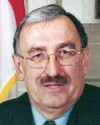Mr. Speaker, let me quote from Hansard :
As long as he keeps silent on this issue, he gives every Canadian...the impression that he himself, the Prime Minister, is there to help his friends, the friends who helped him.
Guess what? That is a quote from the heritage minister back in the days when she believed that prime ministers ought to be accountable.
Why will the Prime Minister not at least uphold the ethical standards of his heritage minister and announce to us all about this conflict of interest?









